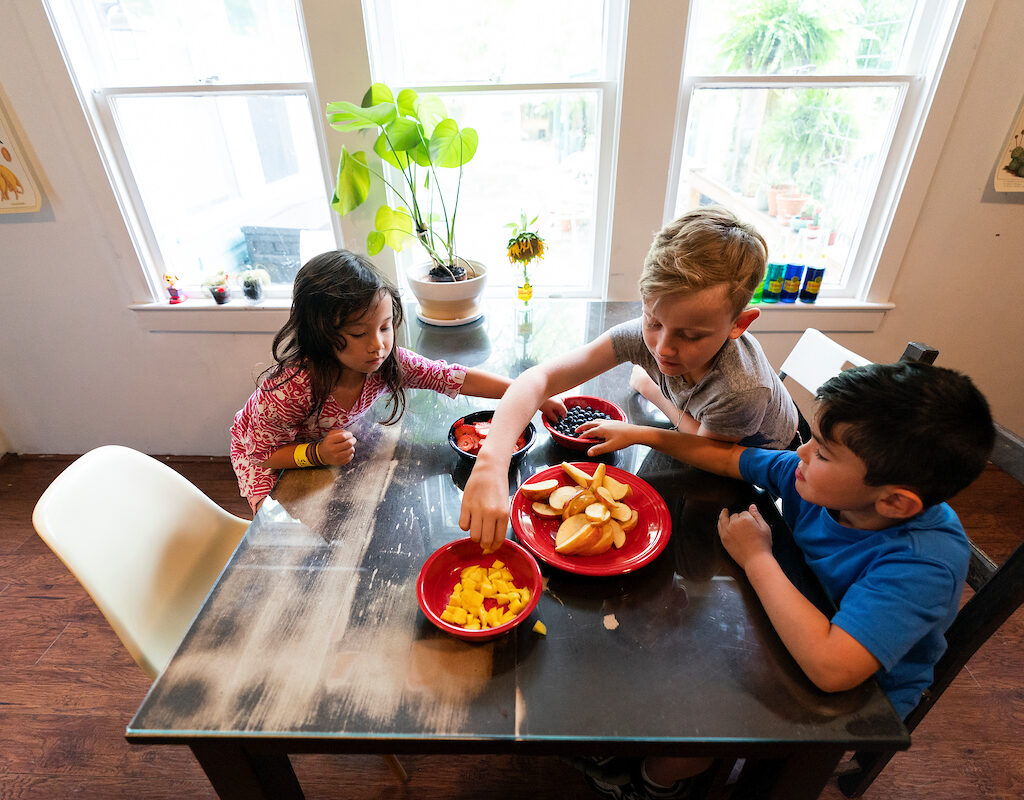Balancing Food & Play
- Type
- Program

Overview
Contact
College Station, TX 77843-2251
Monday – Friday 8:00 am – 5:00 pm
Obesity in the United States is an epidemic- and has been for decades. Texas has the 8th highest obesity rate for youth ages 10-17 with 17.3% being obese. Childhood obesity results in extra health care costs; on average $12,900 more in medical costs than a child with normal weight and is also associated with poorer educational outcomes including a lower GPA, lower reading and math scores, and more school absences.
Teaching children how to live healthy is a good way to help them grow into healthy adults. Balancing Food & Play (3rd thru 5th-grade curriculum) was developed to address children’s health issues by developing lifelong healthy behaviors through nutrition, physical activity, and family engagement. The curriculum is based on the principles of the MyPlate Food Guidance System and the Social Cognitive Model; targeting early childhood health habits while providing youth the opportunity to learn about nutrition and physical activity in an engaging and exciting way, exploring creativity in the classroom, home kitchens, and playgrounds.
AgriLife Extension educators are trained on the program and then in turn train local teachers to implement it throughout the school day. All 20 lessons are available via the Teacher's manual and online virtual lessons are available for teacher use as well. Student journals and parent newsletters/assignments support self-reflection and family engagement. All components of the curriculum, including the online virtual lessons, are available in both English and Spanish.
More choices in Caregiving
- Course
Promoting creativity in an early childhood setting is critical for the development of children’s brains. Environments, daily interactions, and experiences are all opportunities to promote creativity in young learners. Creativity can be expressed through the visual arts, music and movement, and dramatic arts.
After completing this 3-hour course, the learner will be able to describe the elements of creativity, explain how environments can encourage creativity, examine how the arts can support development across all domains in early childhood, and discuss the different categories of creative arts with connections to the four developmental domains. - Course
To grow and excel as an early childhood professional, you must reflect on your teaching practices and child observation to make changes and adjustments to your teaching approach. Intentional early childhood professionals engage in reflective practices and create a professional development plan that builds upon their strengths and enhances their teaching.
After completing this 4-hour course, the learner will be able to describe what an intentional early childhood professional is, explain what reflective practices are and how to implement this information effectively to improve their teaching, explain why being intentional and reflective promotes the development and learning in the children they are teaching, and create a professional development plan based upon their strengthens. - Course
Intentionality is one of the hallmarks of a high-quality learning program. This involves not only using a curriculum that aligns with child development and guidelines, but also ensuring instruction is targeted to the needs of each child in your classroom.
This 4-hour course for early learning educators discusses how to use the cycle of curriculum learning to plan whole group, small group, and individual level to appropriately meet the needs of all learners. - Course
Knowing what children can do and what they know is powerful information that can guide early learning teachers to create appropriate learning experiences for their children. The purposes and types of assessments are examined.
This 4-hour course for early learning educators is designed to review the purposes of assessment, how to evaluate and interpret the results, and create a plan to share results with families. - Course
Although developmental domains are frequently discussed in isolation, that is not the way children learn. Development in one domain impacts the other domains. Children should be engaged in high-quality developmentally appropriate activities that teach multiple areas at one time.
After completing this 1-hour course, the learner will be able to describe how the integration of activities has a positive impact on children’s learning across the domains and create activities that address components in multiple domains. - Course
Maintaining the health of young children – and setting them up with lifelong healthy habits – are critical elements of a quality early childhood program. This course provides an overview of the Texas Healthy Building Blocks recognition program for early care and education settings that have demonstrated a commitment to promoting early childhood health. It is aligned with the guidelines of the Texas Healthy Building Blocks recognition program.
